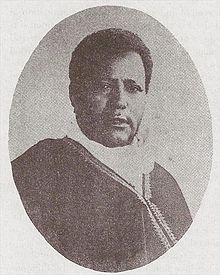Habte Giyorgis Dinagde
This article needs additional citations for verification. (March 2021) |
This article includes a list of references, related reading or external links, but its sources remain unclear because it lacks inline citations. (June 2017) |
Habte Giyorgis Dinagde | |
|---|---|
 | |
| Born | 1851 |
| Died | 12 December 1926 (aged 75) |
| Parent(s) |
|
Fitawrari Habte Giyorgis Dinagde (Quse Dinagde;[1] Amharic: ሀብተ ጊዮርጊስ ዲነግዴ; ; 1851 – 12 December 1926) was an Ethiopian military commander and government official who, among several other posts, served as President of the Council of Ministers and as Minister of War during the reigns of Menelik II, Zewditu and Haile Selassie.
Early life[]
Habte Giyorgis was of Oromo and Gurage descent[citation needed]. He was trained in the art of warfare and later promoted to a high rank in the empire's army under Emperor Menelik II. He was a young prisoner of war, along with Dajazmach Balcha, and was found in South West Shewa. He was later taken to Ankober, Menelik's Shewan capital, before Addis Ababa. As a young man he joined the forces of Menelik, then-King of Shewa, during one of Menelik's campaigns to reinstate Ethiopia's southern lands that had been disunited since the 16th century.[citation needed]
Military career[]
Habte Giyorgis played a leading role in several important battles of Ethiopian history. He participated in many battles, including the Battle of Adwa.
Political potentiate[]
However, he grew to become a skilled military leader and statesman. He was also a central figure in the coup which removed Taytu from power during the period of Menelik II's incapacitation as well as the 1916 coup which deposed Iyasu V and put Empress Zewditu in power.
From 1909 to 1926, Habte Giyorgis was Chief Minister (equivalent to the late title of Prime Minister) of the Council of Ministers to the Emperor of Ethiopia. He was an important figure in the Ethiopian Empire often cited for his great skills as military commander and judiciary.
Legacy[]
A street in Addis Ababa are named after him. He is still today renowned for his wisdom and his military skills.
See also[]
References[]
- ^ "Injifannoo Adwaa: Mallattoo tokkummaa ummata Itiyoophiyaati". obnoromia.com (in Oromo).
External links[]
- 1851 births
- 1927 deaths
- Ethiopian nobility
- Foreign ministers of Ethiopia
- Government ministers of Ethiopia
- Defence ministers of Ethiopia
- Oromo people
- People from Gurage Zone
- Ethiopian people stubs